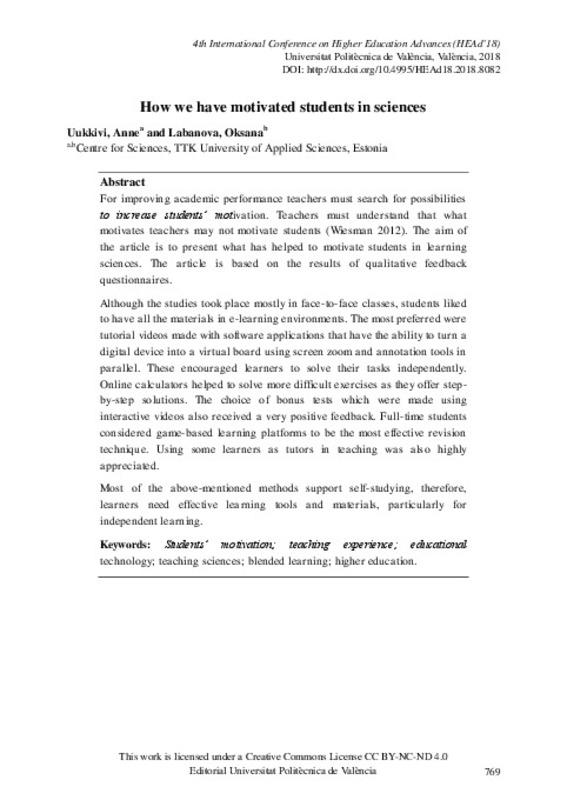JavaScript is disabled for your browser. Some features of this site may not work without it.
Buscar en RiuNet
Listar
Mi cuenta
Estadísticas
Ayuda RiuNet
Admin. UPV
How we have motivated students in sciences
Mostrar el registro sencillo del ítem
Ficheros en el ítem
| dc.contributor.author | Uukkivi, Anne
|
es_ES |
| dc.contributor.author | Labanova, Oksana
|
es_ES |
| dc.date.accessioned | 2018-10-05T13:08:57Z | |
| dc.date.available | 2018-10-05T13:08:57Z | |
| dc.date.issued | 2018-07-02T13:08:57Z | |
| dc.identifier.isbn | 9788490486900 | es_ES |
| dc.identifier.issn | 2603-5871 | |
| dc.identifier.uri | http://hdl.handle.net/10251/109660 | |
| dc.description.abstract | [EN] For improving academic performance teachers must search for possibilities to increase students’ motivation. Teachers must understand that what motivates teachers may not motivate students (Wiesman 2012). The aim of the article is to present what has helped to motivate students in learning sciences. The article is based on the results of qualitative feedback questionnaires. Although the studies took place mostly in face-to-face classes, students liked to have all the materials in e-learning environments. The most preferred were tutorial videos made with software applications that have the ability to turn a digital device into a virtual board using screen zoom and annotation tools in parallel. These encouraged learners to solve their tasks independently. Online calculators helped to solve more difficult exercises as they offer step-by-step solutions. The choice of bonus tests which were made using interactive videos also received a very positive feedback. Full-time students considered game-based learning platforms to be the most effective revision technique. Using some learners as tutors in teaching was also highly appreciated. Most of the above-mentioned methods support self-studying, therefore, learners need effective learning tools and materials, particularly for independent learning. | es_ES |
| dc.description.uri | http://ocs.editorial.upv.es/index.php/HEAD/HEAD18 | es_ES |
| dc.format.extent | 8 | |
| dc.language | Inglés | es_ES |
| dc.publisher | Editorial Universitat Politècnica de València | es_ES |
| dc.relation.ispartof | 4th International Conference on Higher Education Advances (HEAD'18) | |
| dc.rights | Reconocimiento - No comercial - Sin obra derivada (by-nc-nd) | es_ES |
| dc.subject | Higher Education | es_ES |
| dc.subject | Learning | es_ES |
| dc.subject | Educational systems | es_ES |
| dc.subject | Teaching | es_ES |
| dc.subject | Students' motivation | |
| dc.subject | Teaching experience | |
| dc.subject | Educational technology | |
| dc.subject | Teaching sciences | |
| dc.subject | Blended learning | |
| dc.title | How we have motivated students in sciences | es_ES |
| dc.type | Comunicación en congreso | es_ES |
| dc.type | Capítulo de libro | es_ES |
| dc.identifier.doi | 10.4995/HEAD18.2018.8082 | es_ES |
| dc.rights.accessRights | Abierto | es_ES |
| dc.description.bibliographicCitation | Uukkivi, A.; Labanova, O. (2018). How we have motivated students in sciences. Editorial Universitat Politècnica de València. 769-776. https://doi.org/10.4995/HEAD18.2018.8082 | es_ES |
| dc.description.accrualMethod | OCS | es_ES |
| dc.relation.conferencename | Fourth International Conference on Higher Education Advances | es_ES |
| dc.relation.conferencedate | Junio 20-22,2018 | es_ES |
| dc.relation.conferenceplace | Valencia, Spain | es_ES |
| dc.relation.publisherversion | http://ocs.editorial.upv.es/index.php/HEAD/HEAD18/paper/view/8082 | es_ES |
| dc.description.upvformatpinicio | 769 | |
| dc.description.upvformatpfin | 776 | |
| dc.type.version | info:eu-repo/semantics/publishedVersion | es_ES |
| dc.relation.pasarela | OCS\8082 | es_ES |








